- Home
- Anthony Doerr
The Best American Short Stories 2019 Page 10
The Best American Short Stories 2019 Read online
Page 10
She frowned and opened her mouth to reply. But before she could speak, a thin, straw-colored dog appeared from between two parked cars. Claudius, startled, let Sybil’s bike fall to the ground. When the dog began to growl and bark, we tried to get around it. It didn’t move very well, but managed to stay in front of us. It may have been rabid. Some of its pink skin showed through its patches of fur, and in the glow of the streetlight it looked like a mix of hyena and pig. Its rheumy eyes gleamed, the sound of its growling nearly subliminal. I kept my eyes fixed on it. Though the night air had cooled, waves of heat pounded my head. My teeth clenched, and my chest tightened.
The dog edged closer, ready, at any moment, to spring at us as we backed away. Claudius cradled the fez against his chest and cursed under his breath. He slipped behind the rest of us and used us as his shield. I lifted Iris’s bike, ready to throw it, but then Sybil rushed at the dog and kicked its snout. The dog listed for a moment, whined in a way that almost seemed grateful, and then fell over. Iris joined her and they gave several more solid kicks, aimed at the dog’s head and shriveled belly. The animal didn’t move and it wasn’t breathing. All of its wildness had been extinguished. I turned my back even though the violence was done, but odd little murmurs from the girls, disturbing sounds, still reached my ears. Someone’s arms wrapped around me—my own arms, I realized. Not far from where I stood, Claudius’s mouth gaped wider and wider.
The girls got quiet. Sybil walked her bike to us. She was breathing heavily through her nostrils, skin shining from her brief exertions. She went right up to Claudius, grabbed the back of his head, and pulled him down to her for a rough, hungry kiss. His fez crumpled in their embrace.
Unsteadily, I made my way to Iris. As she stood over the unmoving dog, her shoulders rose and fell. She turned to me and ran the palm of her hand down my forehead, smoothing it. “Stop being so . . . astonished all the time,” she said. “It makes you seem old.”
Just then, a man began to shout from behind the bars of a window across the street. “Goddamn!” he said. “Y’all bitches fucked that motherfucker up!”
We laughed, first the girls and then me along with them. Claudius, holding his ruined hat, didn’t join in. I laughed with the girls and all of a sudden it seemed OK—what the two of them had done and how they had done it, that they had been the ones who were brave. It wasn’t just OK; it was exciting, and more.
As we walked on, Iris stared ahead, in a dream state, and asked, “What was the dog offering us? What did its choice of death release into the world?”
I didn’t, couldn’t, reply. It wasn’t clear at all whether her question was even meant for me.
We approached a station for a subway line I’d never even taken before, and Claudius looked back at me. A question formed on his tired, wary face, and I knew what he meant. I shook my head, and he knew what I meant. When I nodded, that was understood too: wherever this night led, we were following it all the way.
The girls’ building was set back from the street and constructed in two moods, with clean brick on the first floor and gray vinyl siding on the second. A single window peeked out from the siding like a jaundiced eye. The girls skipped through the gate, up to the door, and stood in the threshold, waiting for us.
“Where are we?” Claudius muttered.
“Doesn’t matter.”
“We got them home safe. Like they even fucking needed it.”
“And now they want to thank us,” I said. “A couple of goddamned gentlemen.”
“Man, I don’t even know where the hell we are.”
I placed a hand on his shoulder. “Who cares? The whole world is ours tonight, baby.”
Iris asked if we were coming up or what, said to hurry up, she had to pee. I gave Claudius our habitual goofy grin. He stared at me. Finally, in a low voice, he said OK, but he didn’t grin back. We carried their bikes inside.
Other than two Elizabeth Catlett prints on the walls, the living room was barely decorated, as if the girls didn’t actually live here. Did anyone live here? The suggestion was thrilling, that the place was available to anyone in the know who wanted, or who was fated for, a crazy night.
The girls dropped some tablets into our palms—“love drugs,” they said—and I swallowed mine down with a swig of overproof rum. Claudius followed my lead. The girls told us to sit tight and went to take a bath, together. We sank into the softness of their couch and let their voices caress us through the slightly opened door. The girls talked solemnly in the tub, like two sages.
“Does it hurt?” Sybil was saying.
“It does,” Iris said.
I joked, knowing it was lame, that the girls must be taking a bubble bath. Claudius didn’t say a word. Sweat ran from under his warped hat into his eyes. As the girls’ voices floated on and time got fat and lazy, my heart pummeled my rib cage. Drunk and high and nervous, I was ready nevertheless.
They emerged at what felt like the edge of forever, at first wearing only the thinning steam from the bathroom, then essentially nothing, just some stray suds. Iris had strips of bandage on her arm. They stood in front of us and began to pose, slowly turning their bodies so we could admire them from every angle. Their wet feet stained the hardwood floor. I’d never seen such blatant female nudity in person before. Whenever I reached for them, eager to move things along, the girls took a step back. They wouldn’t let me touch them. “Just watch,” Iris said, and I did, we did, until Sybil went into one of the bedrooms and gestured for Claudius to follow.
In the other room Iris, still out of reach, told me to sit on the bed. As she approached, the door opened and Sybil burst into the room. Claudius, fully clothed, shuffled along behind her. “I got lonely,” Sybil said. “I missed you.” Iris said she missed her too. The girls kissed each other in skittish candlelight. I may have imagined it, but from time to time, Sybil’s darker breasts touched Iris’s. They kept smiling at each other until Sybil asked if we wanted in on the action. I said yes and they laughed at how quickly I said it. Sybil told us to take off our clothes. Quickly again, I began to undress but Claudius just stood there, gazing around the room. It seemed like he was trying to remember everything there—the large bed, the flickering light, the heavy curtains—as the setting he might use for an entirely different story. He was remembering everything, it appeared, except the people in it, ignoring us and therefore omitting us. Maybe he was even omitting himself.
While Sybil urged us on, saying she wanted to see what we were working with, Claudius forced his attention through the opening in the curtains, into the darkness outside, in denial of her voice. But then I called his name, scolding in my tone, and pulled his attention back into the room. What was it? The amount of booze we’d had, the drugs, the crazy talk, the vision of that animal dead in the streets, or just the girls themselves? All of it, in combination, made glorious sense to me. We had reached the proper destination of this night. Obviously Claudius and I had never been undressed in each other’s presence—but so what? The girls we’d wanted from the start were offering their fragrant brown flesh to us, and all we had to do was get naked too, together. Why should shyness, if that’s what it was, or fear, or a bit of further strangeness, a little kink in the first blush of day, stop us now? Why shouldn’t this, all of us collected in one room, be our path? I stared at Claudius until he understood I wanted him to do it. He could have said no, to the girls, to me, to that part of himself that also wanted to keep going, and for a second, when he opened his mouth, I expected him to say just that, to shout his refusal. All he did was stand there and tamely nod in assent.
He took off his clothes, as I did, watching the girls as they watched us. When Claudius and I were naked, they didn’t do anything. They weren’t satisfied yet.
“Well,” Sybil said, “look at him.”
I wondered for a second who she meant, but it was a command meant for both of us.
“You have to be fully present,” Iris said, her first words in a long time.
“Look a
t him.”
“He’s your friend.”
“Don’t pretend he’s not there.”
“There’s always more to what you want than what you wanted.” It was Iris again. “You have to take that too.”
I turned to Claudius, standing there with his hands clasped in front of his genitals. Sybil went to him and moved his hands aside. His calves were thin in comparison to his muscular thighs. He had a well-developed chest but a bulging stomach, which was bisected by a vertical stripe of fuzzy hair. His penis was half-erect. Sybil placed the crushed fez back on his head to complete the description of his nudity.
The girls told us to keep looking at one another, through the embarrassment and curiosity, all the way through the entire exposure. They wouldn’t let us pretend otherwise: four naked bodies on the verge of sex together in one room had to be exactly that. We did manage to arrive at sex, Iris with me and Sybil with Claudius, in that room as light began to slip through the gaps in the curtains. I didn’t get to enjoy Iris’s body, not really, because I was too concerned with keeping matters organized, under some semblance of control, fending off the orgiastic. I was much too aware of the other bodies in the room, much too aware of my own. I did, however, get to use my father’s condom. I’d intended to use it, had become fanatical about using it and finally did, just as Claudius—perhaps another true son of another confused father—got to use the condom he carried around in his pocket. We had found our so-called wild and crazy women, and they slept with us. But first they made us look, for a very long time.
In a way, I’m glad I lived such a night before my father died, or completed his long process of dying. On the day of his funeral, watching his rigid, almost smiling face, I was flanked by my mother and her new family. I had kept my distance over the past decade or so, estranging myself, and therefore hadn’t seen her in what felt like ages. At one point, she squeezed my arm and nodded. She didn’t force me to speak to her, and everything she had to say was expressed in those gestures. In her black blazer and dress, with her gray-streaked hair pinned under a slanted hat, she remained a striking woman. What struck me even more than the elegance and dignity with which she was growing older was the presence of her husband and his, their, adult children. They didn’t have to be there. Later, unable to settle my stomach or my mind, I stood alone, just as I had arrived, and my mother and her family talked together on the other side of the room. Other than me, I realized, they were the only black people in attendance. Together the four of them formed a portrait of calmness and grace that made me feel even more sick. I thought about the last public event my father and I attended together, a celebration of his long and successful career. There was desperation in the way he walked around with me, leading me by the arm from guest to guest. To anyone I didn’t already know, he said, “This is my boy. This is my boy.” He showed me off like a prize, as if to eliminate any doubt that I belonged to him. He’d done this kind of thing ever since I was a child. The day of his celebration was the very first time it didn’t make me proud.
What did he mean back on that August morning before I returned to college? Did he believe what he was telling me about happiness? Could he have meant it? Or was he just heartbroken, bitter, drunk? Maybe he knew he was talking to a young fool. Or maybe watching what I did with my life would be his way of figuring everything out. I don’t know, but I keep imagining what it would be like, to be a father to a boy who loves me and believes in me and, despite all our differences, wants nothing more than to be a man in my image. I see that spectral boy, my son, vividly, and feel frightened when he is with me. I have no idea what to say.
Sometimes I feel all I’d have to offer, other than questions, are my memories of that time in Brooklyn and that terrible apartment I had driven us to, obsessed. It sounds ridiculous, even to me, yet it’s true. Among the strangest touches I felt there was my friend’s hand gripping my shoulder, long after Iris and Sybil had left us alone in the room. I gasped when Claudius first touched me. I didn’t look back at him and I didn’t move his hand. I just lay there on my side with my eyes closed and tried not to be awake anymore. When I finally rose it was past noon. My head throbbed, and the faraway sound of the girls’ voices rang in my ears. Claudius was sitting up in the bed, staring at me. At once an acute ugliness shuddered into being, a face revealed within his face, and he must have seen it within mine too. It has been that way with people in my life, with people I have loved: a fine dispersal, a rupture as quiet as two lips parting, a change so sudden one morning, so slight, you wonder if they had ever been beautiful at all.
DEBORAH EISENBERG
The Third Tower
from Ploughshares
Therese
Julia found it in a pile of old stuff. She didn’t want it, so she said she would give it to Therese.
What was she supposed to do with that? Therese said—a beaten up old book with nothing in it but blank paper.
Well, you like to do handwriting, Julia said.
Therese looked at the thing her friend was holding. Then she reached for it.
Julia laughed and her black curls bounced.
That night, Therese puts it away, under her socks—her dear, neatly folded socks. And the next night when she remembers and takes it out, it seems she has come to love it in her sleep, and through the long day at work. Maybe she’ll even take it with her on her trip.
It looks like an ancient thing, with its soft, red cover. It looks like it has some tales to tell, hidden in those blank pages. She runs her fingers over the thick, rough paper, as if to awaken it . . .
Train
Back in the day, railroad tracks crisscrossed the entire country and trains sped morning and night to every corner of the great expanse.
That’s what Therese has heard. She thinks she’s heard that. Or maybe it’s a scrap from a dream—or maybe it’s just an error of her brain; maybe there were no trains at all.
Who knows. But what’s sure is there’s one train now—and it goes through the town where she lives, all the way to the City, where the hospital complex is—lucky!
Felix has hired a temp to cover for her. He’s promised to keep her on when she gets back, one way or another. She’s a good little worker, he says. But for now, the spells have gotten so bad they’re slowing her down.
When he arranged for her to go for the cure, he looked sad, she told Julia.
Hm, Julia had said noncommittally.
And it’s true that Felix always has the same expression—pretty much all the old people do—of vague helplessness, as though they’ve just entered a day full of the troubles they’ve spent the night dreaming about.
But in any case, Therese is going to see the City!
Of course, they’ve all seen it a million times in movies and magazines—the brilliant air, the glistening towers and monuments, sailboats gliding from the serene harbor out toward the endless horizon—the gorgeous, gorgeously dressed men and women, the broad white boulevards, banks of flowers, grand restaurants, magnificent shop windows—great, heavy strands of gems twinkling away on velvet . . .
None of the girls from housing has ever gotten to go there until now, and the others are all jealous.
Really? Therese asks; do they want to go pitching over at random moments like she does? She’d trade any day. (Though, maybe she wouldn’t, actually.)
But she’ll be their eyes and ears, she promises.
The seats are so comfortable, even here in community class. There’s a slight, thrilling jolt, and her heart lifts up as the wheels begin to purr against the tracks.
This morning, Julia knocked on the door of her room and gave her a cardboard box containing a sandwich and an apple so she won’t go hungry on the trip.
Actually, she’s already hungry, even though she’s just settled onto the train. But she won’t open the box yet.
Box! The word is starting to glow and shimmer—
Therese reaches into her satchel for her book and the pen she stole from laundry when Kyra wasn’t loo
king—but she’s too late to do whatever it was she meant to; the word has already exploded and now what’s left of it is just a hard, dry little wad: box. OK, box. But she’s sort of exhausted, as if she has awakened too abruptly from a profound sleep.
Now there’s just darkness—a tunnel, it must be.
Now it’s bright and her town is gone!
She plays a brand-new game on the seat screen, featuring zooming blobs that look like candy. Glossy! You shoot the blobs, and if you hit one just right, it emits a shower of gold coins, and then new blobs zoom in to try to eat the coins before you shoot them too.
The rays of the sun slant at the sooty windows, moving this way and that as the train crosses over a shining river of thick, rainbow-colored mud.
But where on earth are they? Therese has never seen places like this in movies or magazine pictures—these towns! Where no person is to be seen, where the windows are broken or covered over with boards and plastic, everywhere heaps of rusted, rotted trash with here and there a chair leg or part of an antiquated vehicle or a torn, filthy doll, sticking up from it . . .
The desolation spreads out and out, as if someone had tipped over a colossal container of wreckage by mistake.
A tiny train moves through the wreckage, carrying a minuscule speck called Therese. The train clacks slowly over another bridge—a rickety little thing spanning a cleft in the earth—and stirs up a swarm of children, who run along below, trying to keep up. Their faces are streaked with paint, or dirt. They scamper and tumble like wicked little demons, but the rocks and bottles they throw just bounce off the train’s metal shell, and zoom—now they’re just tiny, squiggling specks themselves.
It’s cold, Therese realizes. And her speck self is speeding farther and farther from her friends . . . She holds the box Julia gave her tightly and looks around at the other passengers, but they’re inseparably focused on their screens or devices and their faces are closed . . .

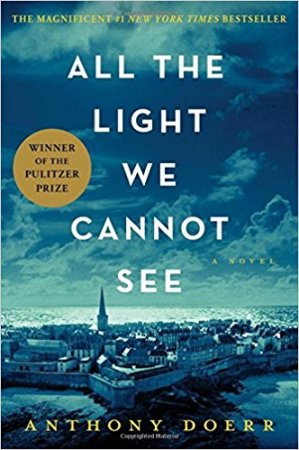 All the Light We Cannot See
All the Light We Cannot See About Grace
About Grace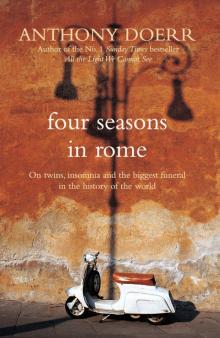 Four Seasons in Rome: On Twins, Insomnia, and the Biggest Funeral in the History of the World
Four Seasons in Rome: On Twins, Insomnia, and the Biggest Funeral in the History of the World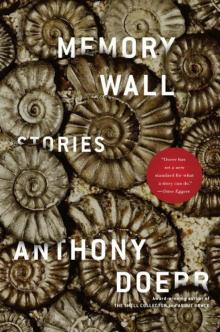 Memory Wall
Memory Wall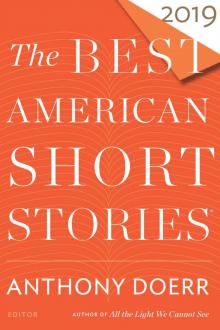 The Best American Short Stories 2019
The Best American Short Stories 2019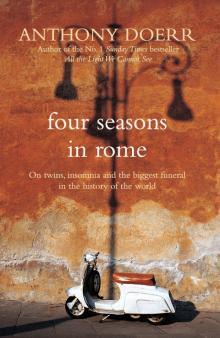 Four Seasons in Rome
Four Seasons in Rome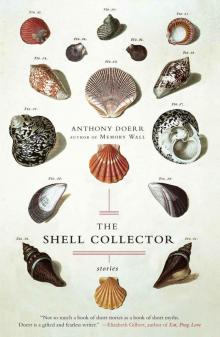 The Shell Collector
The Shell Collector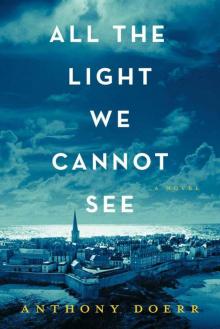 All the Light We Cannot See: A Novel
All the Light We Cannot See: A Novel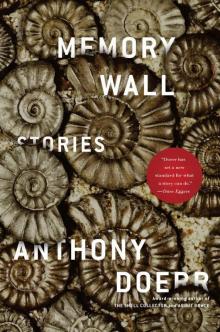 Memory Wall: Stories
Memory Wall: Stories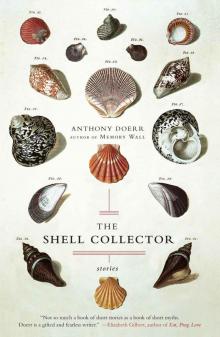 Shell Collector
Shell Collector